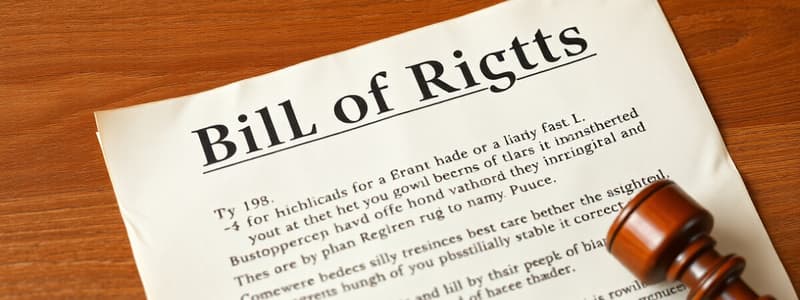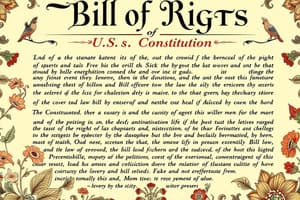Podcast
Questions and Answers
What is the primary context of involuntary servitude?
What is the primary context of involuntary servitude?
- Leisure activities
- Community service
- Forced labor (correct)
- Voluntary labor
ROTC and CWTS are considered grounds for involuntary servitude.
ROTC and CWTS are considered grounds for involuntary servitude.
False (B)
What type of punishment is involuntary servitude sometimes associated with?
What type of punishment is involuntary servitude sometimes associated with?
Forced labor
Involuntary servitude is considered a form of ________ punishment.
Involuntary servitude is considered a form of ________ punishment.
Match the following terms with their descriptions:
Match the following terms with their descriptions:
What is the primary purpose of the Bill of Rights?
What is the primary purpose of the Bill of Rights?
A writ of habeas corpus requires an arrested person to be brought before a judge.
A writ of habeas corpus requires an arrested person to be brought before a judge.
What does the term 'Bill of Rights' refer to?
What does the term 'Bill of Rights' refer to?
The Bill of Rights limits the ________ of the government.
The Bill of Rights limits the ________ of the government.
Match each term related to the Bill of Rights with its description:
Match each term related to the Bill of Rights with its description:
What is the purpose of the Writ of Habeas Corpus?
What is the purpose of the Writ of Habeas Corpus?
The aggrieved party can ask for a dismissal of a case through a mandamus.
The aggrieved party can ask for a dismissal of a case through a mandamus.
What is self-incrimination?
What is self-incrimination?
A person may incriminate themselves through __________, private books, or private letters.
A person may incriminate themselves through __________, private books, or private letters.
Match the legal terms with their definitions:
Match the legal terms with their definitions:
Which of the following is not a form of self-incrimination?
Which of the following is not a form of self-incrimination?
A Writ of Habeas Corpus can address both voluntary and involuntary restraint.
A Writ of Habeas Corpus can address both voluntary and involuntary restraint.
What can aggrieved parties seek through a mandamus?
What can aggrieved parties seek through a mandamus?
What is NOT a requirement for punishments according to Furman v Georgia?
What is NOT a requirement for punishments according to Furman v Georgia?
A person can be imprisoned for not being able to pay debts.
A person can be imprisoned for not being able to pay debts.
List one condition under which a person can be imprisoned for debt.
List one condition under which a person can be imprisoned for debt.
According to Furman v Georgia, punishments must not be ____ to contemporary society.
According to Furman v Georgia, punishments must not be ____ to contemporary society.
Match the following conditions for punishments from Furman v Georgia:
Match the following conditions for punishments from Furman v Georgia:
What is the legal term for committing a crime such as cheating regarding payment?
What is the legal term for committing a crime such as cheating regarding payment?
Punishments for crimes relating to debt can be severe if they are not excessive.
Punishments for crimes relating to debt can be severe if they are not excessive.
What is the consequence for a person found guilty of non-payment of debts under bad faith?
What is the consequence for a person found guilty of non-payment of debts under bad faith?
What does the term 'bad faith' primarily refer to?
What does the term 'bad faith' primarily refer to?
Double jeopardy allows a person to be tried multiple times for the same offense.
Double jeopardy allows a person to be tried multiple times for the same offense.
What is one circumstance under which double jeopardy ends?
What is one circumstance under which double jeopardy ends?
A ______ makes a legislative act that inflicts punishment without judicial trial.
A ______ makes a legislative act that inflicts punishment without judicial trial.
Which of the following statements about Ex-Post Facto Law is true?
Which of the following statements about Ex-Post Facto Law is true?
A Bill of Attainder can be used to punish a group of people without due process.
A Bill of Attainder can be used to punish a group of people without due process.
What is an example of a situation in which double jeopardy ends?
What is an example of a situation in which double jeopardy ends?
Flashcards
Writ of Habeas Corpus
Writ of Habeas Corpus
A legal process used to challenge unlawful imprisonment.
Speedy disposition of cases
Speedy disposition of cases
Cases should be resolved quickly and fairly in court.
Mandamus
Mandamus
Legal order from a higher court to a lower court to take action.
Right Against Self-Incrimination
Right Against Self-Incrimination
Signup and view all the flashcards
Self-Incrimination
Self-Incrimination
Signup and view all the flashcards
Involuntary Restraint
Involuntary Restraint
Signup and view all the flashcards
Remedy (for speedy disposition)
Remedy (for speedy disposition)
Signup and view all the flashcards
No compelled testimony against self
No compelled testimony against self
Signup and view all the flashcards
Bill of Rights
Bill of Rights
Signup and view all the flashcards
Writ
Writ
Signup and view all the flashcards
Individual's rights
Individual's rights
Signup and view all the flashcards
Preventing government violations
Preventing government violations
Signup and view all the flashcards
Legal action (writ)
Legal action (writ)
Signup and view all the flashcards
Involuntary Servitude
Involuntary Servitude
Signup and view all the flashcards
Punishment for Forced Labor
Punishment for Forced Labor
Signup and view all the flashcards
ROTC and CWTS
ROTC and CWTS
Signup and view all the flashcards
Cruel and Unusual Punishment
Cruel and Unusual Punishment
Signup and view all the flashcards
Death Penalty Exception
Death Penalty Exception
Signup and view all the flashcards
Punishment Degradation
Punishment Degradation
Signup and view all the flashcards
Arbitrary Punishment
Arbitrary Punishment
Signup and view all the flashcards
Socially Unacceptable Punishment
Socially Unacceptable Punishment
Signup and view all the flashcards
Excessive Punishment
Excessive Punishment
Signup and view all the flashcards
Debt Imprisonment
Debt Imprisonment
Signup and view all the flashcards
Imprisonment for Deception
Imprisonment for Deception
Signup and view all the flashcards
Estafa
Estafa
Signup and view all the flashcards
Punishment Proportionality
Punishment Proportionality
Signup and view all the flashcards
Bad Faith
Bad Faith
Signup and view all the flashcards
Double Jeopardy
Double Jeopardy
Signup and view all the flashcards
When does Double Jeopardy end?
When does Double Jeopardy end?
Signup and view all the flashcards
Ex-Post Facto Law
Ex-Post Facto Law
Signup and view all the flashcards
Bill of Attainder
Bill of Attainder
Signup and view all the flashcards
Example of Bill of Attainder
Example of Bill of Attainder
Signup and view all the flashcards
What is the purpose of double jeopardy?
What is the purpose of double jeopardy?
Signup and view all the flashcards
Why is an Ex-Post Facto Law unfair?
Why is an Ex-Post Facto Law unfair?
Signup and view all the flashcards
Study Notes
Bill of Rights
- The Bill of Rights is a declaration and enumeration of individual rights and privileges.
- It aims to protect individuals from violations by the state.
Habeas Corpus (Section 15)
- Habeas Corpus is a legal action requiring a person under arrest to appear before a judge or court.
- It compels a person holding another to justify their detention in court.
- The right to Habeas Corpus can only be suspended during invasion or rebellion when public safety demands it.
Speedy Disposition of Cases (Section 16)
- All individuals have the right to a timely resolution of their cases in judicial, quasi-judicial, or administrative bodies.
- If the speedy disposition is violated, the aggrieved party can demand dismissal through mandamus.
- Mandamus is a judicial remedy compelling a lower court, corporation, or government body to perform a specific legal duty.
Right Against Self-Incrimination (Section 17)
- Individuals cannot be forced to testify against themselves.
- This right allows a person to refuse to answer questions that might incriminate them.
- Ways to incriminate oneself include testimony, private letters, and private books.
Prohibition of Involuntary Servitude and Arbitrary Detention (Section 18)
- No person can be detained solely due to political beliefs or aspirations.
- Involuntary servitude is prohibited, except as a punishment for a crime.
- Examples of involuntary servitude include forced labor, ROTC, CWTS
- These activities are considered duties and responsibilities, not grounds for involuntary service.
Prohibition of Cruel, Degrading Punishments(Section 19)
- The death penalty should only be imposed for compelling reasons connected to heinous crimes.
- Death penalties already imposed should be commuted to reclusion.
- The use of physical, psychological, and degrading punishment against prisoners or detainees is unlawful.
- Substandard or inadequate penal facilities are prohibited.
- Punishments must uphold human dignity, not be arbitrary, and be acceptable to contemporary society.
Prohibition of Imprisonment for Non-Payment of Poll Taxes (Section 20)
- Imprisonment for non-payment of debts or poll taxes is unconstitutional.
- A person can not be imprisoned for unpaid debts unless a crime like estafa has been committed .
Protection Against Double Jeopardy (Section 21)
- No one can be tried twice for the same offense.
- A conviction or acquittal for a crime under a law or ordinance prevents further prosecution for the same crime.
- Double jeopardy ends when the accused is acquitted or convicted or the charges are dismissed.
Prohibition of Ex Post Facto Laws and Bills of Attainder (Section 22)
- Ex post facto laws which punish actions that were legal at the time of commission or increase the punishment for a crime are prohibited.
- Bills of attainder, which punish individuals without a trial, are also prohibited.
Studying That Suits You
Use AI to generate personalized quizzes and flashcards to suit your learning preferences.




